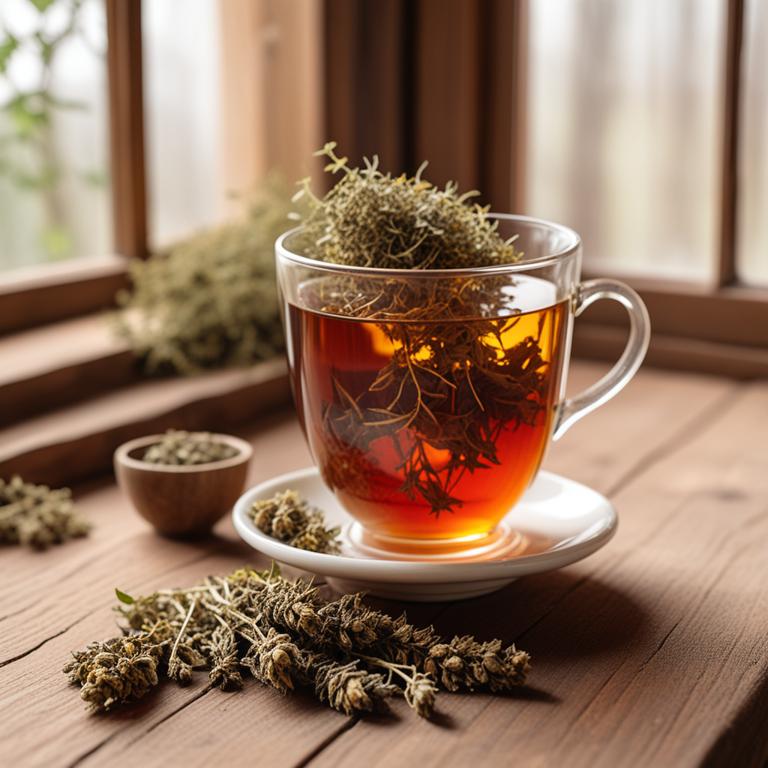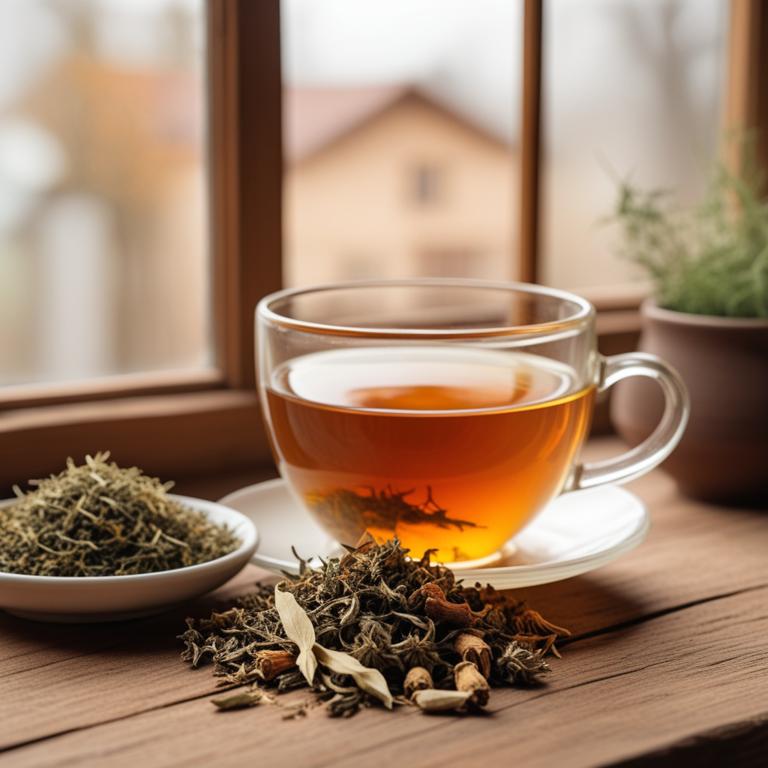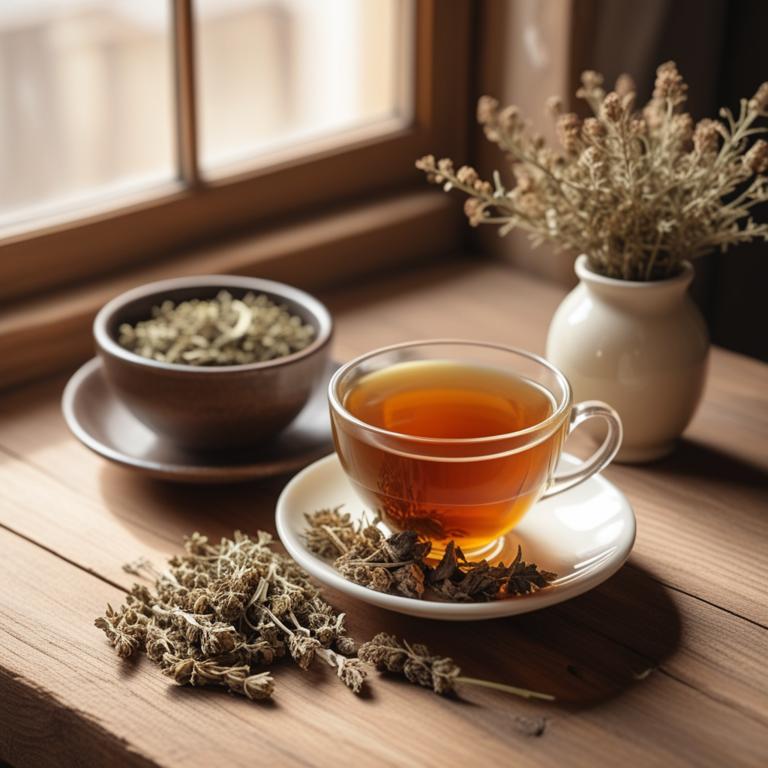11 Best Herbal Teas For Heartburn

Herbal teas for Heartburn are natural remedies that have been used for centuries to alleviate the symptoms of heartburn, a condition characterized by a burning sensation in the chest and throat due to the reflux of stomach acid into the esophagus.
These teas offer a range of benefits, including soothing the digestive system, reducing inflammation, and promoting relaxation.
Some popular herbal teas for heartburn include ginger tea, which has natural anti-inflammatory properties that help to reduce inflammation and alleviate discomfort, peppermint tea, which can help to relax the muscles in the digestive tract and improve digestion, chamomile tea, which has a calming effect and can help to reduce stress and anxiety, licorice root tea, which has anti-inflammatory properties that can help to soothe the digestive system, and slippery elm tea, which can help to protect and soothe the mucous membranes in the digestive tract.
Additionally, other herbal teas such as dandelion root tea, fennel tea, and meadowsweet tea are also commonly used to treat heartburn due to their ability to reduce inflammation, improve digestion, and alleviate symptoms.
According to "Journal of alternative and complementary medicine (New York, N.Y.)", teas for heartburn, such as those made from Myrtus communis and Cydonia oblonga, have shown to alleviate symptoms related to GERD, with some studies even demonstrating a marked reduction in symptoms comparable to the medication omeprazole.
Below there's a list of the 11 best herbal teas for heartburn.
- 1. Zingiber officinale teas
- 2. Foeniculum vulgare teas
- 3. Glycyrrhiza echinata teas
- 4. Curcuma longa teas
- 5. Glycyrrhiza glabra teas
- 6. Zingiber cassumunar teas
- 7. Curcuma wenyujin teas
- 8. Cinnamomum verum teas
- 9. Glycyrrhiza uralensis teas
- 10. Glycyrrhiza inflata teas
- 11. Zingiber mioga teas
Also you may be interested in...
TODAY'S FREE BOUNDLE
Herb Drying Checklist + Herbal Tea Shopping List + Medicinal Herbs Flashcards
Enter you best email address below to receive this bundle (3 product valued $19.95) for FREE + exclusive access to The Aphotecary Letter.
$19.95 -> $0.00
1. Zingiber officinale teas

Zingiber officinale teas, derived from the rhizome of the ginger plant, have been traditionally used to treat heartburn, a common symptom of acid reflux disease.
The anti-inflammatory and carminative properties of ginger help to alleviate heartburn by reducing inflammation in the esophagus and calming the digestive system.
The bioactive constituents of ginger, including gingerols and shogaols, possess potent antioxidant and anti-inflammatory activities that contribute to its therapeutic effects.
Regular consumption of Zingiber officinale teas may provide relief from heartburn symptoms, making it a popular herbal remedy for digestive health.
Related Study
According to "Journal of ethnopharmacology", Zingiber officinale teas for heartburn may be beneficial due to the presence of lariciresinol, a compound that inhibits efflux pumps and could make bacteria sensitive to antibiotic killing at reduced dosage.
2. Foeniculum vulgare teas

Foeniculum vulgare teas, also known as fennel tea, have been traditionally used to treat heartburn and its associated symptoms.
The properties of this herbal preparation, such as its carminative and anti-inflammatory effects, help to alleviate heartburn by soothing the digestive tract and reducing inflammation in the esophagus.
The bioactive constituents of fennel tea, including anethole, fenchone, and borneol, are responsible for its therapeutic effects, as they help to relax the muscles in the digestive tract and reduce the production of stomach acid.
By using fennel tea, individuals can experience benefits such as relief from heartburn symptoms, reduced digestive discomfort, and improved overall gut health.
Related Study
According to "Oxidative medicine and cellular longevity", Foeniculum vulgare teas for heartburn may be beneficial due to the presence of biologically active compounds that have been found to possess significant spasmolytic effects.
3. Glycyrrhiza echinata teas

Glycyrrhiza echinata teas have been traditionally used to treat heartburn due to their anti-inflammatory and soothing properties, which help to calm the digestive system and reduce acidity.
The bioactive constituents, such as glycyrrhizin and flavonoids, exhibit gastroprotective effects by inhibiting the production of stomach acid and enhancing the mucus production in the stomach lining, thereby providing relief from heartburn symptoms.
This herbal preparation also helps to treat heartburn by reducing inflammation and improving digestion, allowing for a more efficient breakdown of food and alleviation of symptoms.
Regular consumption of Glycyrrhiza echinata teas has been found to provide long-term benefits in managing heartburn, promoting overall digestive health and well-being.
4. Curcuma longa teas

Curcuma longa teas, also known as turmeric tea, have been used for centuries to treat heartburn and other gastrointestinal issues due to their anti-inflammatory and carminative properties.
This herbal preparation helps to treat heartburn by reducing inflammation in the esophagus and alleviating symptoms such as acid reflux and burning sensations.
The bioactive constituents of Curcuma longa, including curcumin, demethoxycurcumin, and bisdemethoxycurcumin, have been shown to possess potent antioxidant and anti-inflammatory activities that help to soothe the digestive system and prevent acid reflux.
By consuming Curcuma longa teas, individuals can experience benefits such as reduced inflammation, improved digestion, and relief from heartburn symptoms, making it a natural and effective remedy for this common ailment.
Related Study
According to "Open life sciences", Curcuma longa teas for heartburn have potential benefits due to the presence of the phytochemical compound curcumin, which may alleviate pain and discomfort associated with digestive diseases.
5. Glycyrrhiza glabra teas

Glycyrrhiza glabra teas, also known as licorice root tea, have been traditionally used to treat heartburn due to their anti-inflammatory and soothing properties.
The bioactive constituents, including glycyrrhizin and flavonoids, help to reduce inflammation in the esophagus and alleviate symptoms of heartburn.
Glycyrrhiza glabra teas work by coating the mucous membranes in the esophagus, reducing acid production, and promoting healing, thereby providing relief from heartburn.
The benefits of using Glycyrrhiza glabra teas to treat heartburn include natural relief from symptoms, improved digestion, and reduced risk of complications associated with frequent heartburn.
Related Study
According to "Microbial pathogenesis", Glycyrrhiza glabra teas may be effective for heartburn as they contain compounds such as glycyrrhizin which have been shown to demonstrate antimicrobial activity against H. pylori.
6. Zingiber cassumunar teas

Zingiber cassumunar teas have been traditionally used to treat heartburn ailments due to its anti-inflammatory and carminative properties.
The herbal preparation helps to treat heartburn by reducing inflammation in the esophagus and alleviating symptoms such as acid reflux and bloating.
The bioactive constituents of Zingiber cassumunar teas, including gingerols and shogaols, help to treat heartburn by inhibiting the production of digestive enzymes and relaxing the muscles in the stomach and esophagus.
The benefits of using Zingiber cassumunar teas to treat heartburn include reduced symptoms and discomfort, improved digestion, and a lower risk of complications such as esophagitis and gastritis.
7. Curcuma wenyujin teas

Curcuma wenyujin teas have been traditionally used to treat heartburn, a common symptom of acid reflux, due to their anti-inflammatory and soothing properties.
The bioactive constituents present in this herbal preparation, including curcuminoids and gingerols, help to reduce inflammation and alleviate symptoms of heartburn by relaxing the lower esophageal sphincter and increasing the production of mucus to protect the esophageal lining.
This herbal preparation is beneficial in treating heartburn as it not only provides quick relief from symptoms but also promotes long-term healing of the esophagus by reducing inflammation and promoting the repair of damaged tissues.
Regular consumption of Curcuma wenyujin teas has been shown to be an effective and natural way to manage heartburn and promote overall digestive health.
8. Cinnamomum verum teas

Cinnamomum verum teas have been traditionally used to treat heartburn due to their anti-inflammatory and antacid properties, which help to soothe the digestive system and reduce the burning sensation in the chest.
The bioactive constituents of Cinnamomum verum teas, including cinnamaldehyde and cinnamic acid, have been shown to exhibit gastroprotective and anti-ulcerative effects, making it an effective remedy for heartburn.
By reducing inflammation and promoting the healing of the gastric mucosa, Cinnamomum verum teas can provide quick relief from heartburn symptoms and promote overall digestive health.
The benefits of using Cinnamomum verum teas to treat heartburn include reduced symptoms, improved digestion, and a lower risk of complications, making it a popular natural remedy for those seeking an alternative to conventional medications.
9. Glycyrrhiza uralensis teas

Glycyrrhiza uralensis teas, a traditional herbal remedy, have been used to treat heartburn and its related symptoms.
The anti-inflammatory and soothing properties of this herbal preparation help to calm the digestive tract, reducing inflammation and discomfort associated with heartburn.
The bioactive constituents, including glycyrrhizin and flavonoids, have been found to have a protective effect on the mucous membranes in the stomach, preventing acid reflux and promoting a healthy digestive environment.
By incorporating Glycyrrhiza uralensis teas into one's diet, individuals can experience relief from heartburn and other gastrointestinal issues, promoting overall digestive health and well-being.
10. Glycyrrhiza inflata teas

Glycyrrhiza inflata teas have been used in traditional medicine to treat heartburn, a condition characterized by the backflow of stomach acid into the esophagus.
The anti-inflammatory and soothing properties of this herbal preparation help to treat heartburn by reducing inflammation in the esophagus and providing relief from burning sensations.
The bioactive constituents of Glycyrrhiza inflata, including glycyrrhizin and flavonoids, have been shown to inhibit the production of gastric acid and improve the mucosal barrier in the esophagus, making it easier to manage symptoms of heartburn.
The benefits of using Glycyrrhiza inflata teas to treat heartburn include natural and non-addictive relief from symptoms, reduced risk of complications, and a gentle, soothing effect on the digestive system.
11. Zingiber mioga teas

Zingiber mioga teas have been traditionally used to treat heartburn and other digestive issues due to their soothing and anti-inflammatory properties.
This herbal preparation helps to treat heartburn by reducing inflammation in the esophagus and relaxing the lower esophageal sphincter, thereby preventing stomach acid from flowing back up into the esophagus.
The bioactive constituents of Zingiber mioga teas, including gingerols and shogaols, have been found to possess anti-inflammatory and antioxidant properties that help to alleviate heartburn symptoms.
The benefits of using Zingiber mioga teas to treat heartburn include reduced frequency and severity of episodes, improved digestive comfort, and a lower risk of complications such as esophagitis.